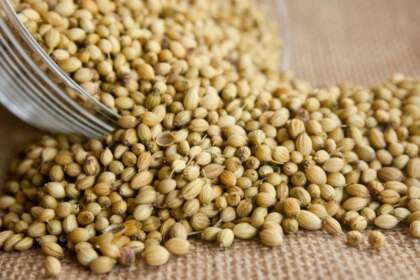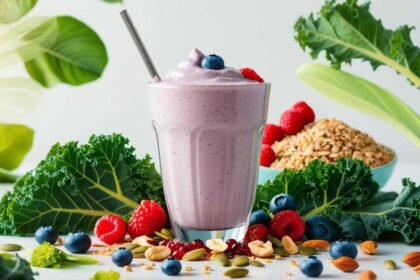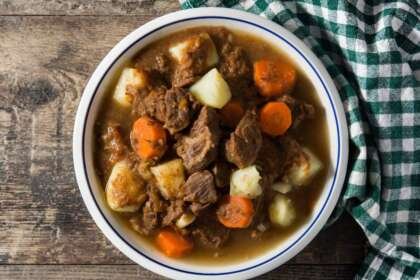Braised lamb shanks are not only considered delicious and tender, but they are also regarded as being packed with nutrients. Inspiration for this dish is taken from different cultures and cuisines, with the flavors being perfectly blended to satisfy your cravings and keep you healthy.
Making braised lamb shanks takes time and effort, but it’s totally worth it. With a little love and attention they go from basic meat to amazing food. And not only do they taste great, but they’re also packed with good stuff that’s good for you.
In this deep dive, we’ll show you all the amazing health benefits of enjoying this classic treat, so you can make delicious decisions that also boost your health.
Nutritional Profile of Braised Lamb Shanks
Here is a detailed nutrition profile for Braised Lamb Shanks presented in a table format:
| Nutrition Facts | |
|---|---|
| Serving Size | 2 oz (56.7g) |
| Braised Lamb Shank | |
| Amount Per Serving | |
| Calories | 138 |
| % Daily Value* | |
| Total Fat | 7.3g (9%) |
| Saturated Fat | 3.2g (16%) |
| Polyunsaturated Fat | 0.5g |
| Monounsaturated Fat | 3.2g |
| Cholesterol | 60mg (20%) |
| Sodium | 40.7mg (2%) |
| Total Carbohydrates | 0g (0%) |
| Dietary Fiber | 0g (0%) |
| Sugars | 0g |
| Protein | 16g |
| Vitamin D | 0.1mcg (0%) |
| Calcium | 11.3mg (1%) |
| Iron | 1.2mg (7%) |
| Potassium | 145.6mg (3%) |
| Caffeine | 0mg |
1. Protein
Braised lamb shanks are rich in nutrients and offer a mix of protein, healthy fats, and minerals. They are a great source of complete protein, which is essential for muscle growth and repair.
2. Healthy Fats
Braised Lamb Shanks is like a supercharged meal, packed with all the good stuff your body needs. They’ve got high-quality protein, healthy fats, and a bunch of essential vitamins and minerals.
And the best part? They are a great source of complete protein that helps your muscles grow, recover, and stay strong.
3. Vitamins and Minerals
Braised lamb shanks are not only packed with protein and fat, but they’re also packed with essential vitamins and minerals.
This meat is a storehouse of nutrients, including vitamin B12 for making red blood cells and keeping your nerves in check.
And it also contains healthy doses of iron, zinc and selenium, which help boost your immune system, brain power and overall health.
So, this study from the Journal of Meat Sience shows just how great lamb is for you. It is rich in protein and important nutrients like iron, zinc and vitamin B12. Basically, adding lamb to your diet can help ensure you’re getting all the essential good stuff, especially if you’re at risk of not getting enough nutrients.
Health Benefits
Braised lamb shanks bring lots of health benefits that go beyond their delicious taste. This super nutritious dish has the power to boost various aspects of your overall well-being, from your heart health to your brain function.
1. Cardiovascular Health
The good fats found in lamb, like monounsaturated and omega-3 fatty acids, are really important for keeping your heart healthy. These fats help lower bad cholesterol and fight inflammation, two important things in preventing heart disease. [Source]
According to Dr. Alice Lichtenstein of Tufts University, eating lamb in moderation is a smart choice for a healthy heart because it contains a good mix of beneficial fats.
2. Muscle Development and Maintenance
Braised Lamb Shanks is a great way to get all the essential amino acids needed to build and maintain lean muscle. This is especially important for athletes, active people, and seniors looking to maintain muscle strength.
Dietitian Emily Braun suggests incorporating lean protein sources like lamb into your diet to reach your fitness goals and keep your muscles strong as you age.
3. Immune System Support
Lamb is rich in zinc, iron and selenium, which helps keep your immune system strong. These minerals are extremely important for helping your body fight infections and heal wounds.
According to nutritionist Dr. Michael Gregor, lamb is a great way to get these minerals and should be part of a healthy diet.
4. Cognitive Function
Braised Lamb Shanks are rich in omega-3 fatty acids and vitamin B12, which are known to boost cognitive function and support brain health. Omega-3 keeps your brain in top shape, while vitamin B12 helps with nerve function and neurotransmitter production.
Harvard nutritional psychiatrist Dr. Uma Naidu says eating foods high in omega-3 and B12, such as lamb, may boost cognitive function and perhaps even prevent age-related decline.
5. Bone Health
Calcium, phosphorus and vitamin D are important for keeping your bones strong. Braised lamb shanks are rich in these nutrients, so they’re a great choice for a bone-friendly diet.
Dietitian Samantha Cassetti suggests adding lamb to your diet to ensure you’re getting enough of these vital nutrients for bone health, especially when combined with other calcium-rich foods.
Expert Opinions
Braised lamb shanks are a delicious and nutritious option that can boost your overall health. According to registered dietitian and author Toby Amidor, lamb is packed with essential nutrients and braised shank is a delicious way to incorporate this nutrient-rich meat into your diet.
Cooking and Preparation Tips
Slow Cooking
To get the most from braised lamb shanks, it’s important to cook them correctly. Slow cooking is key here – it not only tenderizes the meat, but also brings out all the delicious flavors.
Nutrient Retention
Renowned chef and cookbook author, Lidia Bastianich, is passionate about braising. According to him, slow braising lamb shanks is the key to achieving tender and delicious meat that melts in your mouth.
Plus, this cooking method helps preserve vital nutrients, unlike high-heat methods that can strip away vitamins and minerals.
Flavor Enhancement
To make your braised lamb shanks even more nutritious, you can try adding a variety of flavorful herbs, spices, and aromatics.
Ina Garten, a renowned chef, recommends using fresh rosemary, thyme, garlic and onion to give the dish extra flavor that brings out the deliciousness of the lamb.
Portion Control
When enjoying delicious braised lamb shanks it’s a good idea to keep an eye on how much you’re eating. According to dietitian Ellie Krieger, the amount of cooked lamb should be around 4-6 ounces, and it’s best to pair it with some vegetables or whole grains.
Expert Advice
Chef Daniel Humm, who has a Michelin star and is all about using sustainable and local ingredients, suggests that when making braised lamb shanks, it’s best to choose the highest quality pasture-raised lamb from trusted locations.
This way, you will not only get the best taste but also healthier and more eco-friendly food.
You can completely maximize the healthfulness and deliciousness of your braised lamb shanks by cooking them slowly, adding delicious aromas, and keeping an eye on portion sizes. This is definitely a game-changer.
Potential Concerns and Misconceptions
Although braised lamb shanks have their fair share of health benefits, it’s worth mentioning some common concerns and misconceptions about eating red meat.
A big myth is that all red meat is bad for you because of its saturated fat. But, research and nutrition experts have proved this idea wrong.
A recent study in the Journal Foods found that lamb and other ruminant meats contain a good balance of healthy fats, which runs counter to the idea that red meat is always bad for you.
Nutritionist Dr. David Katz says that as long as you don’t overdo it, lean lamb can be a nutritious part of your diet.
When it comes to eating meat, it’s important to keep things in moderation and pay attention to your portion sizes.
Dietitian Kath Younger suggests mixing things up from time to time with braised lamb shanks, and making sure your plate has plenty of vegetables, whole grains, and other healthy foods.
Additionally, it’s a good idea to choose high-quality, grass-fed or organic lamb whenever possible.
These animals are usually raised in more natural environments and are fed a diet that is closer to what they would eat in the wild, meaning they are getting better nutrition.
According to Harvard’s Dr. Frank Hu, grass-fed lamb has more healthy omega-3 fatty acids and less saturated fat than conventionally raised lamb.
If you keep things in moderation, watch your portions, and choose good quality ingredients, braised lamb shanks are a tasty and healthy addition to a balanced diet, without falling into any myths or misconceptions about eating red meat.












